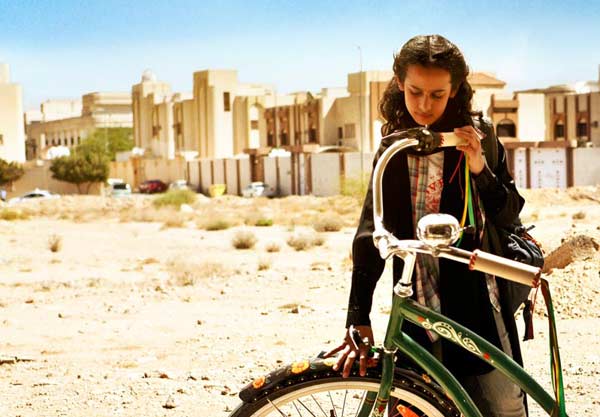As the first feature film to be made in Saudi Arabia — and directed by a woman, no less — you could be forgiven for thinking that 'Wadjda's claims to fame would overshadow its merits as a film, dominating discussion and garnering overhyped praise.
But 'Wadjda' emerges as a simple delight to behold; it’s a film that transcends its extraordinary origins and a beautifully universal story about rebellion and growing up. Wadjda (Waad Mohammed) is a headstrong, entrepreneurial ten-year-old living in the suburbs of Riyadh. She wears Chuck Taylors instead of school shoes, sells bracelets to her classmates, makes mix tapes from the radio, and has a forbidden friendship with neighbourhood boy Abdullah (Abdullrahman Al Gohani).
Her somewhat liberal minded mother (Reem Abdullah) is trying to keep their house together and stop her husband from taking a second wife, and her school principal (Ahd) is trying to ensure Wadjda sees the light and takes the studious, straight and narrow path. But when Wadjda sees a hunter green bicycle racing through the sky atop a delivery van, she decides that it must be hers and finds her one way ticket to finding the funds — her school’s Koran reading competition.
As Wadjda goes about her daily life we are frequently reminded of the place she will assume in her community in a few short years. Her school principal admonishes the girls talking loudly in the schoolyard: “The men will hear you”. When Wadjda announces that she’s bleeding after falling off Abdullah’s bike, her mother exclaims: “Is it your virginity?” In religious club, Wadjda’s young classmates gossip over the pictures of one girl’s wedding.
Writer/director Haifaa Al-Mansour’s work is elegantly understated, bringing these points to our attention but never dwelling too seriously on them; we’re completely aware that Wadjda exists in this world, but it's her quiet rebellion and misadventures that are most important to her story. The film begins strongly, and while it meanders a little as we head towards Wadjda’s quest for victory (and subsequently, a bicycle), it’s delightfully unassuming and is a well-constructed coming of age tale on the whole.
The performances from the largely inexperienced cast are consistently solid, with Waad Mohammed as the titular character delivering one of the most assured acting debuts from a child in recent memory.
'Wadjda's largely conventional story and unassuming production values have drawn criticism from some, arguing that the praise the film has been receiving is somewhat unwarranted. “No one would care if it was American,” they say. But it’s not American. It’s the product of a country stuck in quasi-adolescence by the standards of the Western world, where cinemas are banned and women aren’t permitted to drive. To divorce 'Wadjda' of its context would be doing a great disservice to its importance as a film, and to the energetic ten-year-old at its core.
You may not have experienced Wadjda’s world, but you’ve sung along, alone in your bedroom, to that song you weren’t supposed to be listening to; 'Wadjda' is a film that’s just as universal as it is brand new, and a story for anyone who was ever stuck in a world where they didn’t quite belong.
4/5
– written by Alexandra Donald

